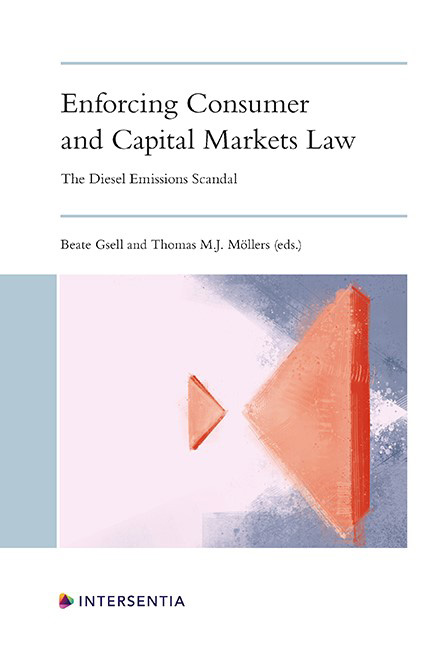Book contents
- Frontmatter
- Acknowledgement
- Contents
- List of Cases
- List of Abbreviations
- List of Contributors
- PART I INTRODUCTION
- PART II EUROPE
- PART II BEYOND EUROPE
- PART III THE SUPRANATIONAL PERSPECTIVE
- PART IV LEGAL PRACTICE PERSPECTIVE
- PART V INTRADISCIPLINARY ANALYSIS AND REFORM RECOMMENDATIONS
- Key Source Bibliography
- Index
- About the Editors
Enforcing Consumer and Capital Markets Law in Brazil
Published online by Cambridge University Press: 22 December 2020
- Frontmatter
- Acknowledgement
- Contents
- List of Cases
- List of Abbreviations
- List of Contributors
- PART I INTRODUCTION
- PART II EUROPE
- PART II BEYOND EUROPE
- PART III THE SUPRANATIONAL PERSPECTIVE
- PART IV LEGAL PRACTICE PERSPECTIVE
- PART V INTRADISCIPLINARY ANALYSIS AND REFORM RECOMMENDATIONS
- Key Source Bibliography
- Index
- About the Editors
Summary
INTRODUCTION
As a non-expert in Capital Market Law, this chapter will focus in particular on the Brazilian approach to enforce consumer law, explaining the dialogue between collective consumer law and the general civil procedural law and how Brazilian Consumer Law has responded to the ‘Dieselgate’ scandal and similar schemes to deceive consumers.
The so-called ‘Dieselgate’ case shows how differently the national consumer law responses to global schemes to deceive consumer are. Brazil, a country that has had a Consumer Code since 1990, an adapted ‘Brazilian- class action’ or collective action and also a very active National Administrative System to Consumer Protection, with more than 600 consumer authorities (PROCON) in the country, can be an interesting example of how an emergent country fights against global schemes.
In the 21st century, the international protection of consumers should be a ‘global’ policy, a minimum standard of the international society and a universal cross-regional ‘demand’. Since the beginning, consumer law and policy had an international calling (in French: vocation international), because problems and models of consumer protection are normally very similar in national, regional, supranational and global markets. Consumers are also important actors in the globalisation process. However, the truth is that, besides the UN Guidelines on Consumer Protection (UNGCP) from 1985, revised in 1999 and 2015, there is no other universal – or ‘global’– legal instrument (either soft or hard law) on consumer protection. People all agree that consumer law on its current scale has an international dimension, but until today – unlike environmental law –, there is no single global convention or binding international legal instrument on consumer protection issues.
When Case 1 is examined, one sees how little coherence there is among the legal responses issued by different jurisdictions. Perhaps an international joint response would be better.
In Brazil, the particular ‘Dieselgate’ case was considered ‘not so severe’, because only 17,057 Volkswagen diesel cars (Amarok-2011 and partially 2012) were equipped with the problematic software, that identified an inspection and corrected the pollution emissions only then. On the other hand, the Brazilian Consumer Code has very strict rules on the veracity of information given to consumers (as well as environmental information) and considers advertising a contractual offer, so the legal responses in Brazil were based on information deficit (a R$7,2 million – circa €1.8 million – fine from the Secretary of Consumer Defense-SENACON) on breach of environmental regulation (R$50 million – circa €12.5 million – fine from the Environmental Agency-IBAMA).
- Type
- Chapter
- Information
- Enforcing Consumer and Capital Markets LawThe Diesel Emissions Scandal, pp. 291 - 314Publisher: IntersentiaPrint publication year: 2020



